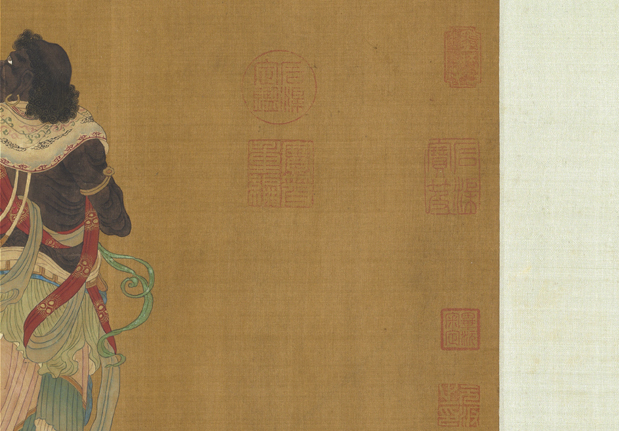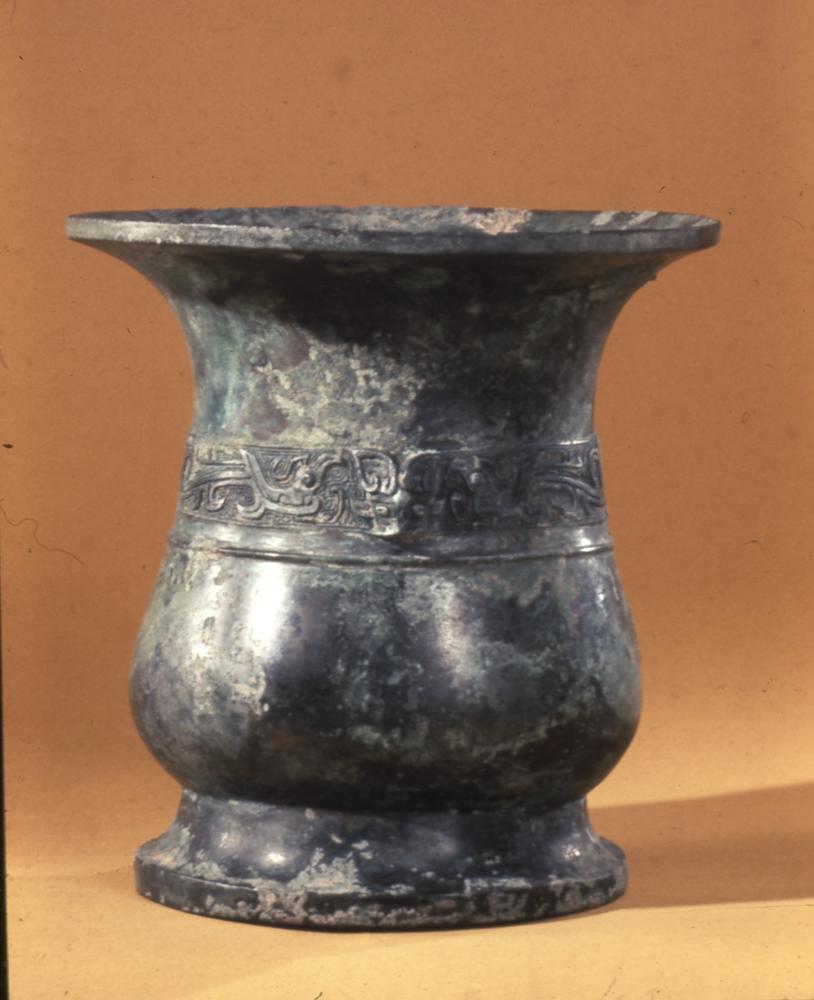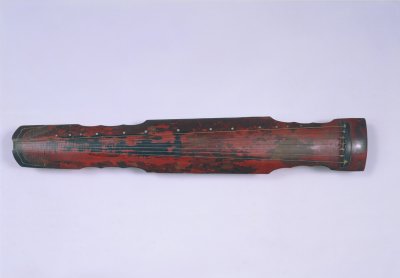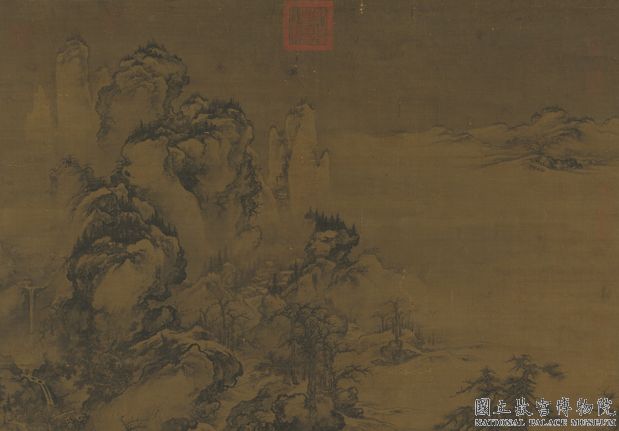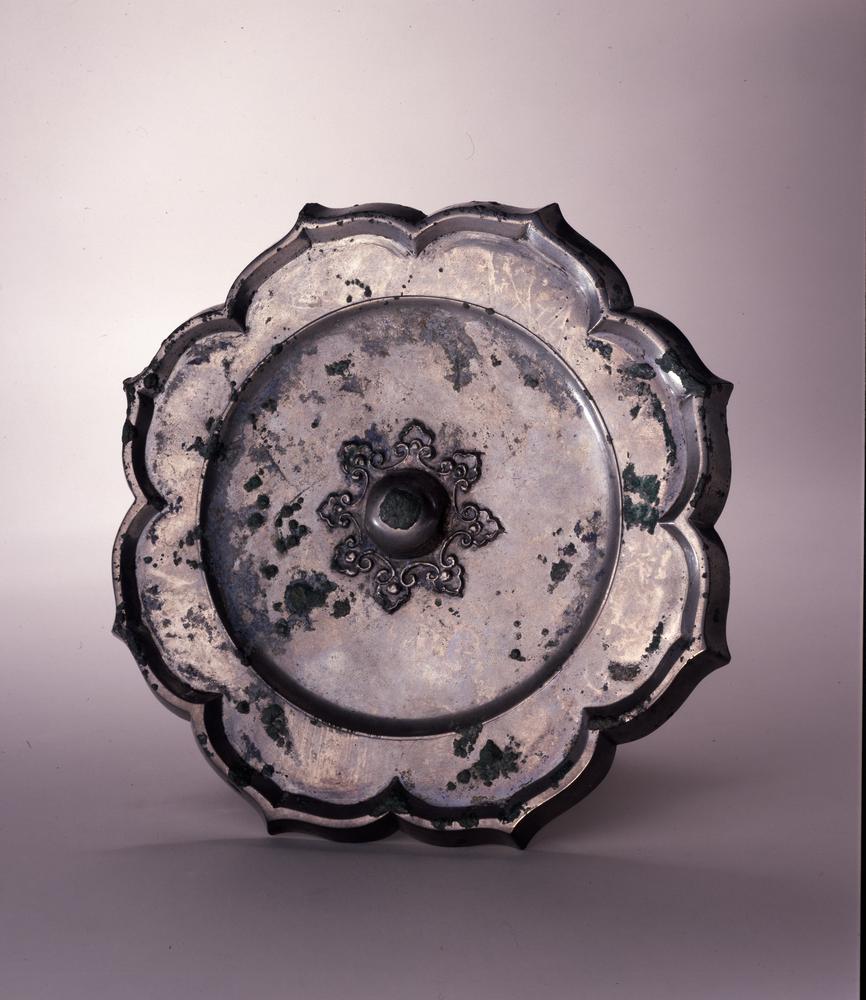Period:Tang dynasty Production date:851-900 (circa)
Materials:silk, 絲綢 (Chinese),
Technique:painted
Subjects:bodhisattva lotus willow vessel 菩薩 (Chinese) 蓮花 (Chinese) 柳枝 (Chinese) 器皿 (Chinese)
Dimensions:Height: 103.10 centimetres Width: 71.20 centimetres
Description:
Painting of Avalokiteśvara with a long dark green scarf, standing on a lotus between two tall, waving stems of lotuses. He holds a willow spray and a sprinkler vase. Ink and colour on silk.
IMG
![图片[1]-painting; 繪畫(Chinese) BM-1919-0101-0.22-China Archive](https://chinaarchive.net/Tang dynasty/Paintings/mid_RFC623_top.jpg)
![图片[2]-painting; 繪畫(Chinese) BM-1919-0101-0.22-China Archive](https://chinaarchive.net/Tang dynasty/Paintings/mid_RFC623_bot.jpg)
![图片[3]-painting; 繪畫(Chinese) BM-1919-0101-0.22-China Archive](https://chinaarchive.net/Tang dynasty/Paintings/mid_RFC623_whole.jpg)
Comments:EnglishFrom Whitfield 1983:The Bodhisattva stands on a lotus pedestal with downturned petals, between two large waving stems with three-petalled flowers intended for lotuses; the topmost flower on the left stem has a fully developed lotus pod. From his shoulders a dark green scarf spirals downwards, in contrast to the upward movement of the flowering stems. In his right hand he holds a willow spray, and in his left a sprinkler vase with a single flower stem somewhat improbably issuing from its tapering mouth.The depiction of the face and torso is for the most part in smooth curves, giving rather full outlines to the face, with plump chest and arms. The hair is shown as a smooth arch over the forehead, with thick black segments behind the shoulders and a high topknot. Some of these features are also visible in Pl.2, and together with details of the garments such as the exaggerated loops of the shorter shoulder scarf, ending just below the elbows, can be compared with, for instance, Vol. 1, Pl.23, which is dated in the fifth year of Xiantong 咸通五年(A.D. 864),and with Stein painting 391 (Ch. 00451, in the National Museum of India, New Delhi),dated with a cyclical combination (甲申十一月)corresponding to the same year, A.D. 864(Stein, Thousand Buddhas, Pl. XLIV). A date in the second half of the ninth century is therefore suggested for this work. The construction is somewhat unusual in that a half-width of silk is sewn down the right side of the painting only. The painting has lost its original borders. ChineseFrom Whitfield 1983:此觀音站在覆瓣的蓮華座上,兩旁好像蓮花樣的帶有三瓣花的植物莖,彎彎曲曲高高挺立著。左側莖上端的花瓣已落,剩下種子。觀音手臂上濃綠色的天衣螺旋狀卷著,與挺立的帶花的莖的變化相對。觀音右手持柳條枝,左手持淨瓶,淨瓶細口中插入一枝頭上有朵小花的彎曲植物。臉和上半身的曲線表現基本流暢,臉、胸部、手臂很豐滿。頭髮在寶冠上高高梳起,在額的部分繪成優美的弧線,從兩肩後垂下。使用濃墨,輪廓線鮮明。上一圖中也出現了這種髮型和衣著的細部描繪,特別是從肩到肘的短綬帶,在肩頭突出成兩層的輪形裝飾的表現等,可與有咸通五年(864年)紀年的四觀音文殊普賢圖(參照第1卷圖23)、及等於864年的干支題記“甲申年十一月”的新德里國立博物館收藏的作品(參照Serindia.Ch.00451,《千佛洞》圖版44)等相比,此作品的年代相當於9世紀後半葉。繪畫用絹的組成方式與通常略有不同,畫面右半部只續接了半幅絹。沒有邊絹。
Materials:silk, 絲綢 (Chinese),
Technique:painted
Subjects:bodhisattva lotus willow vessel 菩薩 (Chinese) 蓮花 (Chinese) 柳枝 (Chinese) 器皿 (Chinese)
Dimensions:Height: 103.10 centimetres Width: 71.20 centimetres
Description:
Painting of Avalokiteśvara with a long dark green scarf, standing on a lotus between two tall, waving stems of lotuses. He holds a willow spray and a sprinkler vase. Ink and colour on silk.
IMG
![图片[1]-painting; 繪畫(Chinese) BM-1919-0101-0.22-China Archive](https://chinaarchive.net/Tang dynasty/Paintings/mid_RFC623_top.jpg)
![图片[2]-painting; 繪畫(Chinese) BM-1919-0101-0.22-China Archive](https://chinaarchive.net/Tang dynasty/Paintings/mid_RFC623_bot.jpg)
![图片[3]-painting; 繪畫(Chinese) BM-1919-0101-0.22-China Archive](https://chinaarchive.net/Tang dynasty/Paintings/mid_RFC623_whole.jpg)
Comments:EnglishFrom Whitfield 1983:The Bodhisattva stands on a lotus pedestal with downturned petals, between two large waving stems with three-petalled flowers intended for lotuses; the topmost flower on the left stem has a fully developed lotus pod. From his shoulders a dark green scarf spirals downwards, in contrast to the upward movement of the flowering stems. In his right hand he holds a willow spray, and in his left a sprinkler vase with a single flower stem somewhat improbably issuing from its tapering mouth.The depiction of the face and torso is for the most part in smooth curves, giving rather full outlines to the face, with plump chest and arms. The hair is shown as a smooth arch over the forehead, with thick black segments behind the shoulders and a high topknot. Some of these features are also visible in Pl.2, and together with details of the garments such as the exaggerated loops of the shorter shoulder scarf, ending just below the elbows, can be compared with, for instance, Vol. 1, Pl.23, which is dated in the fifth year of Xiantong 咸通五年(A.D. 864),and with Stein painting 391 (Ch. 00451, in the National Museum of India, New Delhi),dated with a cyclical combination (甲申十一月)corresponding to the same year, A.D. 864(Stein, Thousand Buddhas, Pl. XLIV). A date in the second half of the ninth century is therefore suggested for this work. The construction is somewhat unusual in that a half-width of silk is sewn down the right side of the painting only. The painting has lost its original borders. ChineseFrom Whitfield 1983:此觀音站在覆瓣的蓮華座上,兩旁好像蓮花樣的帶有三瓣花的植物莖,彎彎曲曲高高挺立著。左側莖上端的花瓣已落,剩下種子。觀音手臂上濃綠色的天衣螺旋狀卷著,與挺立的帶花的莖的變化相對。觀音右手持柳條枝,左手持淨瓶,淨瓶細口中插入一枝頭上有朵小花的彎曲植物。臉和上半身的曲線表現基本流暢,臉、胸部、手臂很豐滿。頭髮在寶冠上高高梳起,在額的部分繪成優美的弧線,從兩肩後垂下。使用濃墨,輪廓線鮮明。上一圖中也出現了這種髮型和衣著的細部描繪,特別是從肩到肘的短綬帶,在肩頭突出成兩層的輪形裝飾的表現等,可與有咸通五年(864年)紀年的四觀音文殊普賢圖(參照第1卷圖23)、及等於864年的干支題記“甲申年十一月”的新德里國立博物館收藏的作品(參照Serindia.Ch.00451,《千佛洞》圖版44)等相比,此作品的年代相當於9世紀後半葉。繪畫用絹的組成方式與通常略有不同,畫面右半部只續接了半幅絹。沒有邊絹。
© Copyright
The copyright of the article belongs to the author, please keep the original link for reprinting.
THE END
![[Qing Dynasty] British female painter—Elizabeth Keith, using woodblock prints to record China from the late Qing Dynasty to the early Republic of China—1915-China Archive](https://chinaarchive.net/wp-content/uploads/2022/11/image-191x300.png)
